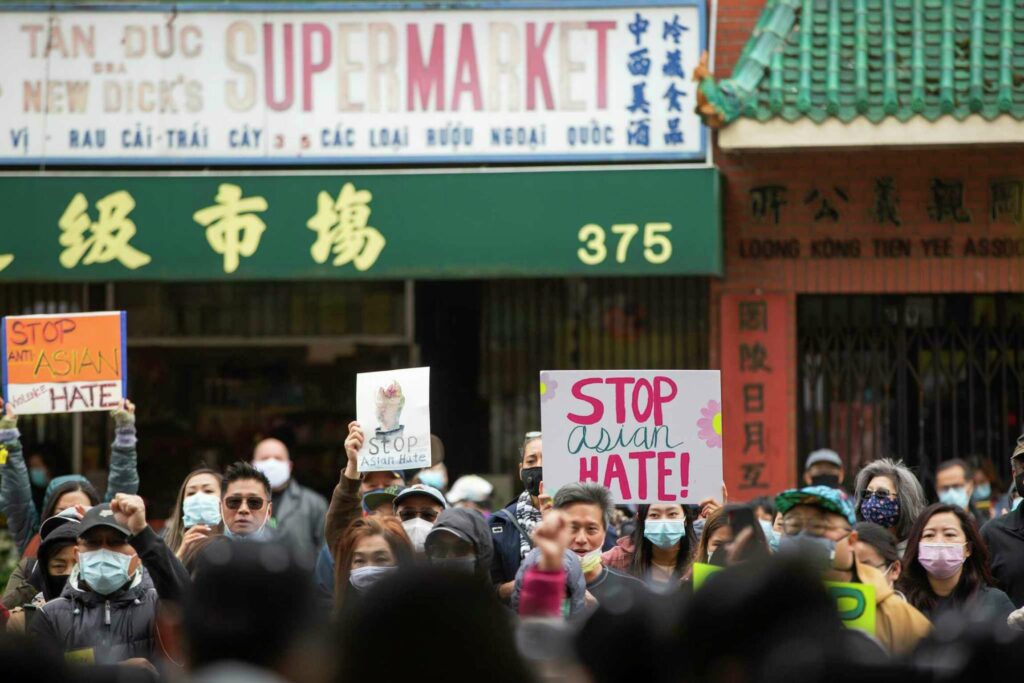
By Cynthia Choi, Co-Executive Director
As I sat down in an uncrowded BART train one evening, I noticed a man staring at me. I avoided his gaze and scanned the train for other passengers. He started making vulgar gestures. I tensed up and quickly got off the train well before my actual stop. He then followed me off and yelled, “I know you want some of this, you China bitch!”
Those few minutes felt like an eternity and left me shaken and terrified. It was another harrowing story in my growing personal bank of harassment incidents I have collected over the years.
What I experienced — street harassment — is sadly all too common, especially against Asian American women since the COVID-19 pandemic. Street harassment is unwanted or intimidating comments, gestures or actions directed at an individual in public spaces such as on the street or on transit. According to the most recent Stop AAPI Hate data, noncriminal incidents like harassment comprise the vast majority of harmful hate incidents that Asian American and Pacific Islander community members experience. Two out of three (67%) of the nearly 11,500 reported hate incidents nationally involve street harassment. In California, where the largest proportion of these incidents occur, three-quarters happened in public spaces. In San Francisco, 64% of reported incidents involved harassment.
And these incidents are continuing unabated.
Street harassment can cause anxiety and trauma, even when it’s not violent. I know I’m not alone in the fear I felt that night on BART. The micro-calculations and decisions I make about safety go down to the type of shoes I should wear. Like many others, I am now more anxious and vigilant when I am out in public.
Of course, this is not just an Asian American and Pacific Islander issue. All women intimately know what it feels like to be harassed on the street. Hate is also on the rise for Black people, other people of color and LGBTQ+ folks in California and across the country. Additionally, individuals with disabilities, the young and the elderly are frequent targets of hate and harassment, and in worst-case scenarios, physical harm.
We all deserve to feel safe while on public transit. That’s why Stop AAPI Hate crafted a unique solution to stop this deeply ingrained societal issue.
SB1161, authored by state Sen. Dave Min, D-Irvine, creates a community survey for transit agencies to use so they can understand where, when and why street harassment occurs and how it affects transit riders. The world renowned Mineta Transportation Institute at San Jose State University will establish a statewide standard for rider experience and data collection that will inform strategies to improve rider safety — the first tool of its kind in the state.
Through my more than 25 years in policy and community organizing, I have learned that the people closest to the problem must be part of the solution. SB1161 requires the institute to work with vulnerable community members and the 10 largest transit operators in California to gather critical input for the community survey.
This survey, informed by those with lived experience, will help officials capture a deeper understanding of street harassment, a currently invisible yet pervasive problem in our transit systems. This is essentially why we started Stop AAPI Hate — to name a problem we know to be true but not widely discussed, to provide an avenue for our experiences to be heard and to make data driven policy recommendations.
We already know these strategies work on a regional level. BART worked directly with impacted riders on its Not One More Girl initiative, which started off in 2019 as a youth-led movement, a research report and steadfast grassroots organizing involving 500 youth. It resulted in a public education campaign, a rider data set and significant policy changes. BART riders now have additional safety thanks to the presence of unarmed personnel, such as transit ambassadors. The other result is that transitional-aged youth now serve on BART’s hiring panels for these ambassadors. Over a year after the initiative’s launch, BART’s ongoing survey data shows that 43% of respondents felt safer riding BART after learning about the initiative.
Similarly, Los Angeles Metro’s groundbreaking report, “Understanding How Women Travel,” is the result of a comprehensive and creative approach to analyze the mobility needs, concerns and preferences of female riders. The report’s findings formed the foundation of an action plan with recommendations to improve the travel experiences of women.
These two agencies have taken steps to understand and improve rider safety, but the vast majority of California’s more than 100 transit operators have not done the same. Some may not even know where to start. SB1161 makes the community survey available for any transit operator to use, so that even smaller or less-resourced agencies can begin confronting the street harassment their riders experience.
As hate and harassment continues to rise, SB1161 is not only an essential stepping stone to making public transportation safer: It has the potential to increase public transit ridership, which has positive environmental effects.
California has a unique opportunity to become a national leader, once again, in better understanding street harassment in public transit so we can prevent incidents before they happen.
When I think about that frightening night on BART, I feel angry and frustrated not just for myself, but for our society as a whole. I want my three daughters to know that we have the power and the will to address how California deals with harassment in public transit.
We cannot fix what we do not measure.
Cynthia Choi is co-founder of Stop AAPI Hate and co-executive director of Chinese for Affirmative Action.



